Rocambole
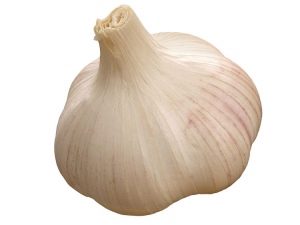
Rocambole, also called onion, Egyptian onion, Spanish garlic, onion-garlic, came to us from the Central Asian regions, where it grows freely even in the wild.
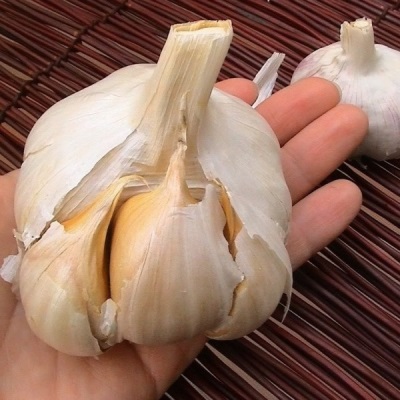
Appearance
Rocambole, or Spanish garlic, is a perennial plant in the onion family.
Rocambole is often referred to as garlic. In fact, rocambole has a milder taste and smell. At the same time, separate children can form in him.
Rocambole has light green leaves and a rough surface. They are wider at the base than at the top. The leaves have a light coating of wax and are slightly folded inward in the center. The leaves are flat, their length is about 30 cm, and their width is about 3 cm.
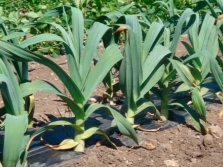
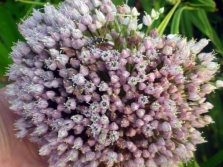
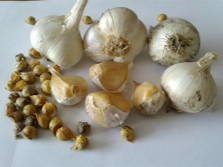
Spanish garlic bulbs can grow even in not very fertile lands and can reach a weight of 100 g with a diameter of 7 cm. If you plant rocambole in good soil and provide proper care, then the bulbs can reach a weight of 0.3 kg with a diameter of 10 cm .
Those bulbs and their babies that were grown from cloves are not divided into slices. Then, in appearance, rocambole resembles an onion. A year later, large bulbs are formed, in which, on average, there are 5 cloves. Then rocambole takes on a resemblance to garlic.
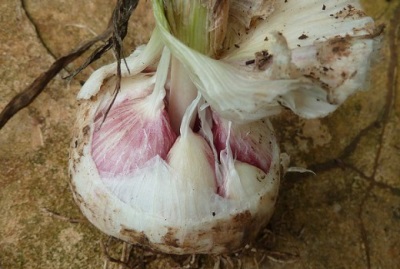
Where does it grow?
Spanish garlic originated from Central Asia, where it can be safely found in the wild. There is evidence that in some regions of Spain and Egypt, it also grows in the wild. It is grown by the Japanese, Koreans, Chinese. It is also popular in the Caucasus and Europe. Rocambole also grows in Turkey, Egypt, Greece.Now it can be found in Russia.
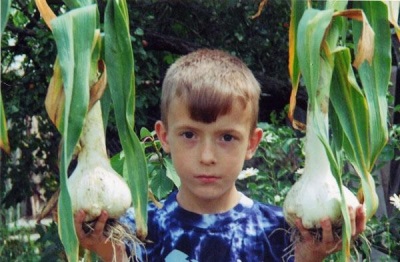
Kinds
Rocambole is currently grown in the form of two different species. The first is a variety of rocambole, the breeding of which was based on the onion. Developing, such a rocambole gives small heads, and bulbous inflorescences form from them.
The second is a variety of rocambole, which was bred from grape onions. It has rather heavy heads. Such rocambole propagates vegetatively, without the formation of seeds.
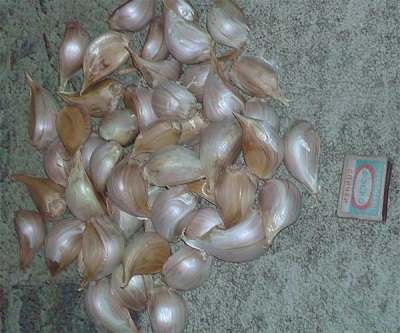
collection time
The crop is harvested at a time when the lower leaves begin to gradually dry out, and the upper ones turn yellow and fall to the ground. Harvest time is difficult to predict precisely, as soil, weather, and fertilizer play a role here, but usually you can harvest rocambole as early as the end of September. Frosts are not particularly terrible for him. When the bulbs are shaken off the ground, they are not beaten, but carefully cleaned, since they are highly sensitive to damage.
The tops are then not cut off, but simply tied up in bunches and dried in a dry room with good ventilation. Then the stems with roots are cut off, but not to the very base. Rocambole can be safely stored at standard room temperature and remain unchanged until the next harvest.
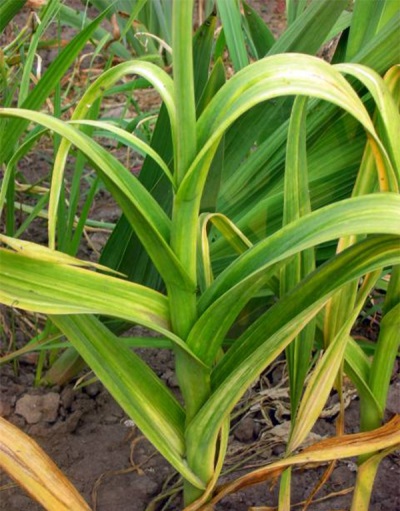
Characteristics
The taste of rocambole is immediately similar to both garlic and onion. Only it has a milder flavor and is not bitter. The cloves have a pronounced juiciness, and the bulbs have dense scales on top.
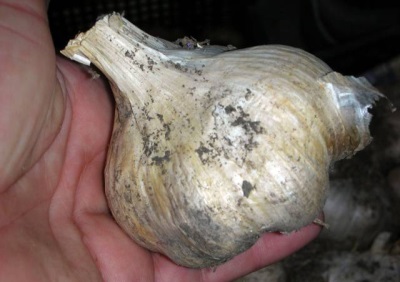
Nutritional value and calories
Nutritional and energy value per 100 gr. raw product
| Squirrels | Fats | Carbohydrates | Alimentary fiber | calories |
|---|---|---|---|---|
| 6.36 gr. | 0.5 gr. | 30.96 gr. | 2.1 gr. | 149 kcal |
Chemical composition
The content of vitamins and minerals in 100 gr. raw product
| vitamins | Minerals | ||
|---|---|---|---|
| PP (niacin equivalent) | 0.7 mg | Calcium | 181 mg |
| B1 (thiamine) | 0.2 mg | Magnesium | 25 mg |
| B2 (riboflavin) | 0.11 mg | Sodium | 17 mg |
| B5 (pantothenic acid) | 0.6 mg | Potassium | 401 mg |
| B9 (folic acid) | 3 mcg | Iron | 1.7 mg |
| C (ascorbic acid) | 31.2 mg | Zinc | 1.16 mg |
| E (tocopherol) | 0.08 mg | Copper | 299 mcg |
| K (phylloquinone) | 1.7 mcg | Manganese | 1.672 mg |
| Choline | 23.2 mg | Selenium | 14.2 mcg |
How many grams of rocambol (grated) in one spoon?
One teaspoon - 5 grams
One tablespoon - 18 grams
In one glass 200 ml. - 135 grams
One glass contains 250 ml. - 170 grams
Beneficial features
The effectiveness of Rocambole is invaluable for:
- heart, cardiac muscles and blood vessels;
- protection against viruses and fungus;
- digestive tract;
- skin.
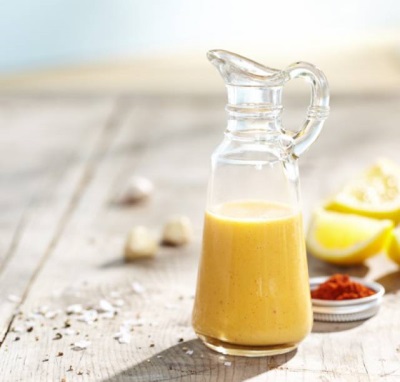
In relation to the cardiovascular system, rocambol has a number of important beneficial actions:
- the chemical components of rocambole help expand blood vessels and improve blood flow, which significantly reduces the likelihood of blood clots;
- allicin in the composition of chemical components is an excellent antioxidant that reduces the amount of bad cholesterol;
- fresh Spanish garlic contains a large amount of germanium, due to which the vessels become more elastic. This applies to the entire cardiovascular system as a whole.
The well-known antiviral properties of rocambole are successfully used to protect against viral diseases and not only:
- due to phytoncides in the composition of Spanish garlic, the body strengthens its immunity, so it is not so easy for harmful bacteria to achieve their goal;
- when using rocambole, you can recover very quickly after an illness;
- Egyptian onion can be safely used instead of other natural antibiotics. It contains a lot of substances containing sulfur, so rocambole is successfully used against many dangerous microorganisms;
- Rocambole releases essential oils, inhaling which you can effectively get rid of nasal congestion.
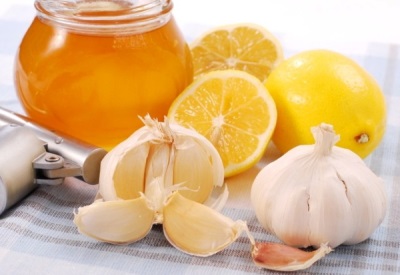
Rocambol not only improves digestion, but also helps in the following cases:
- due to the high content of sulfides, the Egyptian onion becomes a universal antidote that easily removes toxins from the body;
- rocambol is able to improve appetite, activate the production of gastric juice;
- Spanish garlic helps the intestines work better;
- rocambole helps with irritations or sores in the digestive tract.
You can learn about all the qualities of rocambole from an excerpt from the program "Harvest beds".
Rocambole has benefits not only for the skin, but also for hair and even gums:
- baked rocambole will help strengthen the gums;
- gruel from the Egyptian onion, added to the hair mask, promotes their growth and strengthening;
- Spanish garlic juice can be used to treat skin inflammations, abscesses, since rocambole has a disinfecting effect.
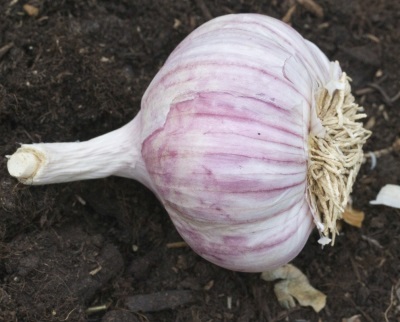
Harm
Despite the fact that the vegetable is very useful, it also has its drawbacks and side effects:
- rocambole helps a lot in the treatment of any disease, but it cannot be used as the main drug;
- due to the sharpness, it is not recommended to consume a vegetable in large quantities;
- headaches are possible;
- the quality of vision decreases;
- possible diarrhea;
- a burning sensation may appear in the chest area;
- skin irritation and itching may occur.
- in some cases, a spasm of the heart vessels and brain vessels is possible.
Rocambol should not be used if:
- you have gallbladder disease;
- you have a stomach ulcer;
- there are pathological diseases of the kidneys;
- internal bleeding occurs.
It is also better for pregnant women not to abuse rocambole.Children can be slowly accustomed to eating a vegetable after three years. At first, it is not recommended to give rocambole in its pure form to young children.
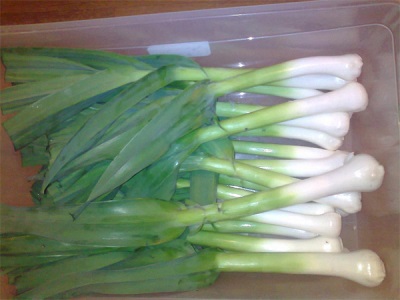
Application
In cooking
Rocambole is a very popular vegetable. It is used in cooking in a variety of cases:
- the vegetable is used as a seasoning with a spicy spicy taste;
- bulb leaves can be eaten fresh or pickled;
- the Chinese season fish dishes with rocambole;
- Koreans cook kimchi with rocambole, and also with its help beat off the smell of fish from the dish;
- rocambole is also used as a seasoning for baked meat and other dishes;
- Rocambole leaves are often cut into salads;
- cloves can be added to pickled vegetables, as they add piquancy to the marinade.
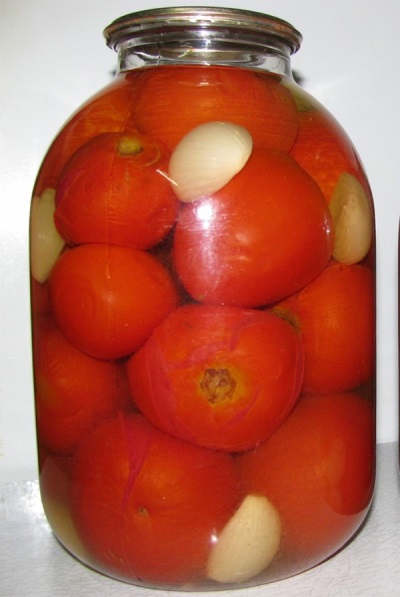
There are different recipes for marinated rocambole:
- For example, rocambole is divided into cloves, poured with hot water, in which it is left for 24 hours. Then the vegetable is laid out in jars, poured with boiled marinade, and the jars are rolled up. In this form, it is stored in the refrigerator.
- Rocambole is cleaned from the husk, put it in a 0.5-liter jar, filling it to the top. Then pour boiling water over the vegetable, add salt and sugar and put the jar in boiling water for 5 minutes. For such a container, you need 1 tablespoon of vinegar 9%, 1 tablespoon of sugar and half a teaspoon of salt.
- The vegetable is divided into slices, poured with hot water and left for 24 hours. Then they are laid out in jars, poured with boiled marinade, and the jars are rolled up. Rocambole is stored in this form in the refrigerator. In order to prepare a liter of marinade, you need: a glass of sugar, 1 tablespoon of salt (a little less), a few black peppercorns, a few bay leaves, a glass of 9% vinegar.
- Rocambole heads are washed and peeled, divided into cloves and put in jars. Fill it with brine. In this form, it is left for a month in a dark and cool place, covering the jars with lids. Then the vegetable is taken out and washed both it and the jars with cool water. Rocambole is put in them again and poured with marinade. Banks are closed with lids and put them in the cold for 3 weeks. After that, the vegetable can be eaten.
Marinade can be prepared in two ways:
- For half a glass of water, take the same amount of 9% vinegar, 1 tablespoon of sugar and a tablespoon of salt;
- For a glass of water take half a glass of fresh beet juice, 1 tablespoon of sugar and the same amount of salt, 1.5 cups of vinegar 9%. To prepare the brine, 6 tablespoons of salt are taken per liter of water.
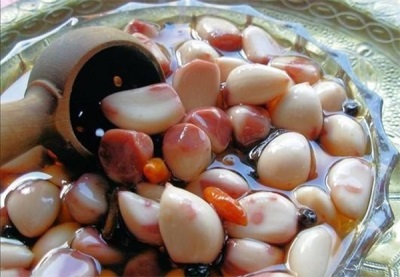
There is another interesting Spanish chicken recipe with the addition of rocambol:
- take a chicken or its individual parts;
- also need 600 g of rocambole, 50 ml of soy sauce and the same amount of sesame oil and garlic vinegar. Measure out a little less than a glass of port, and also take a small amount of sage and thyme, fresh or dry;
- the chicken is butchered and cut into pieces, the rocambole is also cut, the sage and thyme are crushed;
- mix all the ingredients, salt the chicken and add a little ground chili to it;
- in such a marinade, the chicken is kept for about a day in the refrigerator;
- after 24 hours, the chicken is taken out, dried and fried in a pan until a crust forms;
- transfer the chicken to a saucepan, add the remaining marinade and water (broth is possible);
- stew the chicken for an hour and a half on low heat.
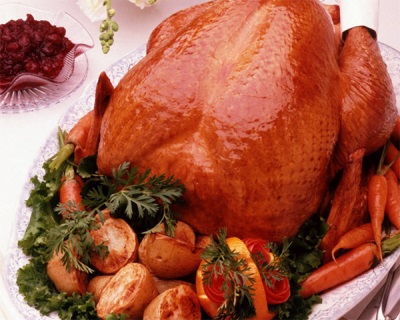
In medicine
For medical purposes, rocambol is used quite often, because it has a number of very useful properties:
- rocambol improves blood flow, reducing the risk of blood clots;
- vegetable reduces the amount of bad cholesterol in the blood;
- rocambol is used as a preventive measure to protect against viral infections;
- it is used in treatment as a natural antibiotic;
- Spanish garlic helps treat a runny nose;
- it also removes toxins from the body;
- rocambole produces bile;
- the vegetable does an excellent job with diarrhea and colitis, as well as worms;
- it treats tumors in the digestive tract
- rocambole is a natural antiseptic and has a wound healing property;
- hematomas are lubricated with vegetable juice, as it helps in the healing of bruises;
- the Egyptian onion does not allow fermentation and decay to occur in the intestines;
- it is often advised to use rocambole for atherosclerosis and high blood pressure;
- vegetables restore the vocal cords and clean the mucous surface of the throat;
- rocambole saves with the appearance of pulmonary asthma, gout, flatulence;
- with it, you can fight diseases of the spleen.
For pharmacological purposes, the vegetable is used not in its pure form, but in the form of tinctures.
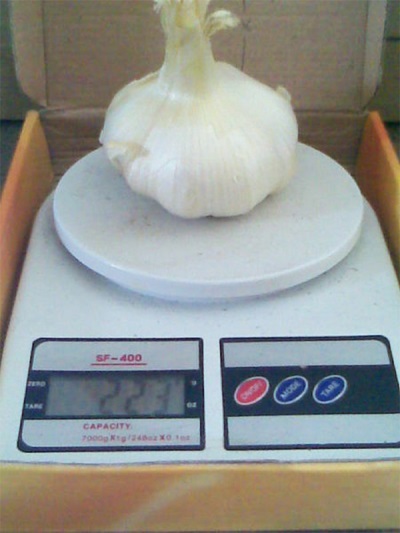
cultivation
Rocambole can be grown with cloves. Landing is best done in an area where there is a lot of sun. The soil is pre-fertilized and cultivated. The most favorable time for planting rocambole is early spring, the soil must first be moistened. Previously, the beds are loosened up to 15-20 cm deep. The soil is supplied with humus or compost. So that the plants grow evenly, the bulbs and cloves are sorted by size.
If the bulb consists of many cloves, then it is peeled and divided into cloves. Before planting, the seeds should be soaked in a solution of potassium permanganate overnight.Between the beds there should be a distance of about 30 cm, between planted seeds - 20 cm. Seeds are planted in the soil to a depth of 10 cm.
When the rocambole slowly begins to rise, the earth will need to be carefully loosened. At the same time, the vegetable will need a lot of water. When the top layer of the earth dries up, the soil must be loosened. If it seems that the plants are withering, then this means that the soil needs top dressing and fertilizer. When the first shoots appear, the soil is supplied with nitrogen fertilizers.
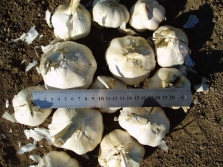
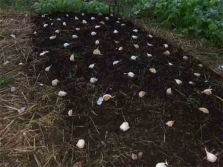
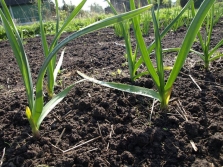
It is necessary to dig out the rocambole in a timely manner, since the scales covering the bulbs will begin to collapse. The bulbs themselves can break up into cloves. There is also the possibility of rocambole rotting in the soil.
Winter onion-garlic should be planted in early October. In potassium permanganate, it is not necessary to soak the cloves. The distances between the beds and the planted cloves are left the same as in the previous case. The planting depth is the same. When the first sprouts appear, the earth is loosened both between the rows and around the stem, but with great care. In the hot summer, do not skimp on watering. They say that the sharpness of rocambole directly depends on the hot climate. Winter rocambole matures faster, so you can harvest it as early as July.


















I really want to grow such a giant in my garden!
Why garlic has light brown spots, which I just haven’t tried, maybe the earth is not like that (chernozem)
It is strange that they write about the value of a root crop, although in my opinion its value is in greenery. In spring, it rises first from under the snow. The leaves are juicy, fleshy. I really advise everyone.
I don't eat garlic or onions. But I want to plant rocambole in my area, as an exclusive.
Very tasty and unusual salad of young leaves and boiled eggs, I also recommend it. We planted it many years ago, we don’t dig it out - it grows on its own, it’s already a plantation, no problems with watering. In the spring we cut off all the leaves, make a salad, then plant asters between the bulbs. I water the flowers during the summer, feed them and this is enough for garlic. As soon as the snow comes down - and now it already appears, the leaves are the width of the palm of your hand. Consume while the leaves are young, then they will become tougher.
Bought today on the market out of ignorance. The seller said it was garlic. I'm in shock, tomorrow I'll exchange it for normal garlic. There is no smell of garlic at all, and the taste is like cinchona.
I also prefer greens. Root crops, for my taste, with bitterness.